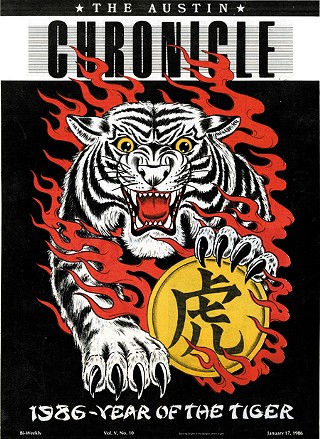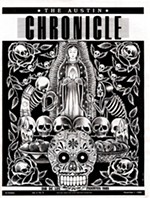2010: Year of the Tiger
If 'Year of the Golden Tiger' doesn't sound like 'prosperity' to you, you're not trying
By Kate Thornberry, Fri., Feb. 12, 2010
This year Chinese New Year falls on Feb. 14, when the Year of the Tiger will be ushered in. 2010 is not just the Year of the Tiger; it is the Year of the Golden Tiger. If that doesn't sound like economic recovery to you, you just aren't trying. It is a very auspicious year. According to online Chinese astrologer "BigCow," it promises to be "a dynamic" year, a "courageous" year, in which "things that have needed to get done but were not due to some blockage will be done or at least see significant progress being made." (Health care reform?) "The impossible just might be possible during this exciting time." (Oh, definitely!) In fact, "now is the time to attack the most difficult issues you face," because this year provides "one of [the] best chances of achieving a breakthrough!"
Chinese New Year, also known as Spring Festival, is the most important of the traditional Chinese holidays. The Chinese year very sensibly begins in the spring, at the beginning of the agrarian year. New Year's Day is the first day of the first month of the Chinese calendar, just as the American New Year's Day is the first day of the first month of the Gregorian calendar. The Chinese calendar, however, is lunisolar; each month begins on the first day of the new moon (also known as the dark of the moon). Holidays that are governed by moon cycles, like Easter, Passover, and Chinese New Year, move around and fall on a different Gregorian calendar day each year. If you aren't watching the phases of the moon, or have in fact lost all touch with the rhythms of the celestial firmament, you can just remember that Chinese New Year tends to occur between late January and Feb. 19.
Speaking of which, you know those entertaining Chinese zodiac place mats that tell you your Chinese zodiac sign based on your birth year? Because of this "floating" New Year's Day, they're not entirely accurate for Westerners; if you were born in January or February, you may be going through life thinking you are a pig when you are really a dog. Or, as in my own case, thinking you are an ox, like all the rest of your friends, when you're really – oh I hate to admit this in a public forum – a rat.
The traditional Chinese New Year festivities, like most holidays the world over, are a mash-up of different traditions. To start with, New Year's Eve is the most important feast of the year, a feast at which the entire family makes an extraordinary effort to be together. The period around Chinese New Year is the time of the largest human migration on Earth, with 2.26 billion passenger journeys in a 40-day period, as the Chinese get home for New Year's Eve.
The feast itself playfully features dishes, the names of which sound like desirable occurrences: For instance, fish is always served, because the Chinese word for "fish" sounds like the word for "surplus." Dumplings, Buddha's delight, rice pudding, and mandarin oranges are traditionally served as well and represent luck, prosperity, a prosperous year, and fortune, respectively.
The most famous image of Chinese New Year celebration is the dragon parade, in which 60 or more dancers animate a gigantic papier-mâché dragon with an enormous devouring mouth, swirling and dancing down the street, allowing individuals and businesses to feed the dragon with money in exchange for good luck. (In Hollywood movies, high-speed chases have a tendency to collide with the dragon parade.) Legend has it that in ancient times, Nian, this particular dragon (when he was real, not papier-mâché), used to devour the people when they gathered for the New Year's feast. Eventually, a wise man convinced Nian that human beings were unworthy of his palate and that it would be nobler to eat the wild animals that just happened to be plaguing the Chinese farmers. This ushered in a time of peace and plenty.
According to another legend, it was noticed that the dragon Nian was afraid of a small child who wore red. Therefore, painting the window frames and doors of one's house red as well as wearing red are advised. It is also thought that Nian is easily spooked by loud noises, and what's better than setting off thousands of firecrackers and energetically clanging cymbals?
Although no one wants to be eaten by Nian, it is considered lucky to be noticed by him. You are fortunate if he stops in his dance to gaze at you; if he does, be ready to feed him some money.
Chinese New Year is also the time of gift-giving. Rightly ascertaining that the best gift is always money, elders fill red envelopes with money to give to the younger folks. The gifts can be a few dollars or hundreds, but they must always be even-numbered amounts, for odd-numbered amounts are given at funerals, and you should not be thinking of funerals on New Year's Day. In fact, undertakers traditionally hide all of New Year's Day so as to not to jinx anyone.
The single most important thing you can do to observe the Chinese New Year is to keep your focus on the good fortune you desire and banish all ill thoughts and sights. Everything possible must be done to attract good luck and prosperity and to focus the mind on joyful happenings. To prepare for Spring Festival, the entire house must be cleaned from top to bottom to sweep out all of the old bad luck, dirt, and dust. (When the blessed day actually arrives, you must not touch the broom or dustpan all day so that the new good luck won't be swept out by accident! Also, you must not touch scissors, because you might accidentally snip the thread of good fortune.) The home should be decorated with red paper cutouts, red lanterns, and auspicious poems and sayings. As mentioned above, a new coat of red paint should be applied to one's red surfaces, and it isn't a bad idea to get a haircut and an outfit of brand-new clothes.
Whoever or whatever you see first on New Year's Day will set the tone for the coming year (hence the voluntary hiding of undertakers). It is encouraged to forgive any grudges you may be harboring, to reconcile differences, and to sincerely wish happiness and prosperity to everyone.












